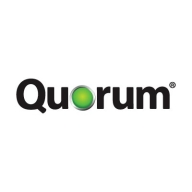

Nasuni and Quorum OnQ are competitors in the file management and disaster recovery sectors. Nasuni has the upper hand in comprehensive file management solutions, while Quorum OnQ is favored for its effective recovery and simplicity.
Features: Nasuni provides global file locking, cloud-backed storage, and disaster recovery. Quorum OnQ offers instant recovery capabilities, automated backup testing, and high security for critical operations.
Room for Improvement: Nasuni could improve file replication speed and SOC 2 compliance while addressing challenges in managing small files. Quorum OnQ could enhance support for diverse operating systems and improve its user interface and backup for SQL servers.
Ease of Deployment and Customer Service: Nasuni supports Hybrid, Private, and Public Cloud environments with strong technical support. Quorum OnQ is primarily on-premises and Hybrid Cloud, known for its quick response times and comprehensive customer service.
Pricing and ROI: Nasuni’s pricing is per terabyte with cloud storage costs, offering significant ROI despite potential high data usage expenses. Quorum OnQ is a medium-cost solution with strong ROI due to efficient recovery features, although initial hardware costs may be higher.
I rated the scalability as seven because even though the solution can scale, load balancing must be done manually, as it's not automated.
I suggest Nasuni improve their syslog forwarders to support TCP protocol, as it's more secure than UDP, which is plain text and not protected at all.
The URL for our environments is the same, making it confusing for management when handling different departments with different needs.
I prefer solutions with lower pricing.
It's a little expensive.
The features I find most valuable in Nasuni are the unlimited snapshots, antivirus capabilities, auditing, and ransomware protection.
Quorum OnQ provides an elevated ability to filter on everything from people's location to age to their voting history.
| Product | Market Share (%) |
|---|---|
| Nasuni | 1.0% |
| Quorum OnQ | 0.8% |
| Other | 98.2% |
| Company Size | Count |
|---|---|
| Small Business | 3 |
| Midsize Enterprise | 8 |
| Large Enterprise | 24 |
| Company Size | Count |
|---|---|
| Small Business | 19 |
| Large Enterprise | 4 |
Nasuni is a file data services enterprise focused on assisting firms with their digital transformation, global expansion, and information awareness. The Nasuni File Data Platform is a suite of cloud-based services designed to enhance user productivity, ensure business continuity, provide data intelligence, offer cloud options, and simplify global infrastructure. This platform and its auxiliary services are projected to replace conventional file infrastructure such as network attached storage (NAS), backup, and Disaster Recovery (DR), with an expandable cloud-scale solution. By storing file data in scalable cloud object storage from multiple providers, Nasuni positions itself as a cloud-native alternative for traditional NAS and file server infrastructure. Based in Boston, Massachusetts, USA, Nasuni serves sectors like manufacturing, construction, technology, oil and gas, financial services, and public sector worldwide, offering its services in more than 70 countries.
James J., IT Manager at a marketing services firm, says Nasuni’s management dashboard is helpful because he's able to view all of the different filers at once rather than check each one of them individually. He values the software’s security, reliability, good performance, helpful alerting, and responsive support.
According to a Server Engineering Services Lead at a mining and metals company, Nasuni offers good OR and DR capabilities, performs well, offers data security, and continuous file versioning helps recover from hardware failures.
The Managing Director of IT at a construction company appreciates Nasuni because it eliminates a lot of work that was previously done when managing backing up and restoring data files.
Quorum onQ is the global leader in 1-click instant recovery, providing full immediate recovery of your critical systems after any storage, system or site failure. It does this by automatically maintaining up-to-date, ready-to-run virtual machine clones of your physical and virtual servers stored on a dedicated appliance – clones that will transparently take over for failed servers within minutes.
We monitor all Cloud Backup reviews to prevent fraudulent reviews and keep review quality high. We do not post reviews by company employees or direct competitors. We validate each review for authenticity via cross-reference with LinkedIn, and personal follow-up with the reviewer when necessary.